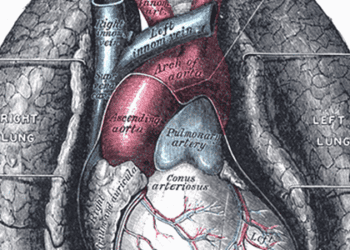Blood cell clones with acquired mutations linked with increased risk of blood cancers
1. Clonal hematopoiesis with acquired mutations is associated with increasing age and is a strong risk factor for subsequent blood cancer.
Evidence Rating Level: 2 (Good)
Study Rundown: White blood cells are generated from stem cells in the bone marrow. When a stem cell acquires a mutation — a change in its DNA — that mutation is passed on to all the cells that arise from it. This population of cells sharing the same mutation is called a clone. In some cases, these clonal populations may expand, and become more common in the blood. It is believed that clonal expansions like this precede the development of cancer. This paper sought to determine how common clonal expansions are, what mutations are most common in these clones, and whether they precede cancer.
In this study, the authors performed whole-exome sequencing (a form of extensive DNA sequencing that stops short of sequencing the entire genome) on about 12,000 individuals. The authors found “clonal hematopoiesis” in 10% of participants over 65 but only in 1% of participants younger than 50. It was also found to be a strong risk factor for subsequent blood cancer. Many of the genes mutated in the clones were recognized drivers of blood cancers.
This work raises the possibility of screening individuals for clonal expansion as a risk factor for blood cancer. However, additional work is needed to determine how to identify those with highest risk of progression to blood cancer and to determine what sort of intervention would be appropriate for these individuals.
Click to read the study in NEJM
Click to read an accompanying editorial in NEJM
Relevant Reading: Detectable clonal mosaicism from birth to old age and its relationship to cancer
In-Depth [ retrospective cohort]: Whole-exome sequencing was performed on blood samples from over 12,000 Swedish persons from a cohort that had previously been used to study schizophrenia (~5,000 individuals with schizophrenia). This data was correlated with clinical information from Swedish national databases.
Approximately 450 individuals were identified with clonal hematopoiesis. Of these, 13 developed blood cancer after the DNA sampling. Eighteen out of about 9,000 individuals without clonal hematopoiesis developed a subsequent blood cancer. The hazard ratio for subsequent blood cancer in persons with clonal hematopoiesis was 12.9, P<0.001. Persons with clonal hematopoiesis also had reduced overall survival, but there was an association of clonal hematopoiesis with smoking.
More from this author: Early risk factor for progression of cystic fibrosis identified, Gut microbes implicated in stroke and heart attacks: new dietary link, New leukemia mutation offers therapeutic targets, Childhood ADHD associated with increased risk of suicide, A marker of aggressive liver cancer and potential therapeutic target identified
Image: PD
©2014 2 Minute Medicine, Inc. All rights reserved. No works may be reproduced without expressed written consent from 2 Minute Medicine, Inc. No article should be construed as medical advice and is not intended as such by the authors, editors, staff or by 2 Minute Medicine, Inc.





![Injectable loaded microparticle scaffolds improve vaccine responses in mice [PreClinical]](https://www.2minutemedicine.com/wp-content/uploads/2014/12/Vaccination_US_Navy-75x75.jpg)
